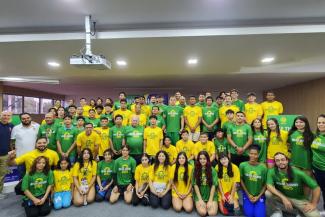More Than Medals Americas wraps up in Rio de Janeiro
Tuesday, July 8, 2025 - 14:07 By United World Wrestling Press

RIO DE JANEIRO, Brazil (July 8) — With young athletes at the center of United World Wrestling’s development strategy, the 2025 edition of *More Than Medals Americas* was held in Rio de Janeiro, Brazil, from June 23rd to 29th, following the U17 Pan-American Championships.
Over the course of seven days, 46 wrestlers and 10 coaches from 11 countries came together for a full program of training sessions, educational workshops, cultural excursions, and recreational activities making this a comprehensive experience beyond the mat.
Held at the state-of-the-art facilities of CEFAN (Centro de Educação Física Almirante Adalberto Nunes), the camp kicked off with a vibrant opening ceremony, attended by Brazilian Wrestling Federation President Flavio Cabral and UWW Education Director Zach Erret. The schedule included three daily meals, on-site accommodation, and seamless logistics that contributed to the event's success.
Among the educational highlights were sessions on safe sport, mental health, injury prevention, and anti-doping each delivered by expert facilitators in a format designed to foster active participation from the athletes. These workshops aimed to equip young wrestlers not only with athletic tools but with life skills as well.
The technical sessions were held on four official mats, strength training, and physical conditioning. Coaches collaborated in a joint planning meeting to create an integrated training environment, where athletes learned from each other’s styles and backgrounds.
Outside the gym, participants explored the iconic city of Rio de Janeiro. They visited Sugarloaf Mountain, Christ the Redeemer, and the historic Maracanã Stadium. An ecological outing to Copacabana Beach was also part of the program, emphasizing environmental awareness—even if a planned cleanup was rendered unnecessary thanks to local conservation efforts.
This edition of *More Than Medals* once again demonstrated the transformative power of sport. Participants described the experience as “great,” and organizers emphasized that the success of the program lies in its ability to holistically nurture the next generation of wrestlers not just as athletes, but as global citizens.


Share your thoughts.
Comments